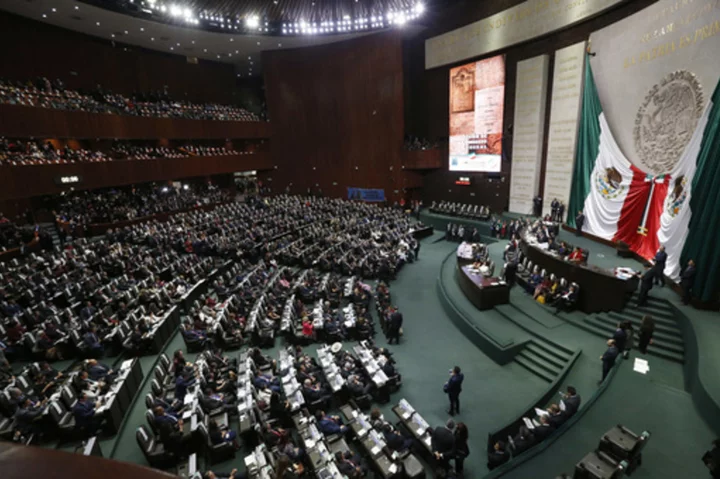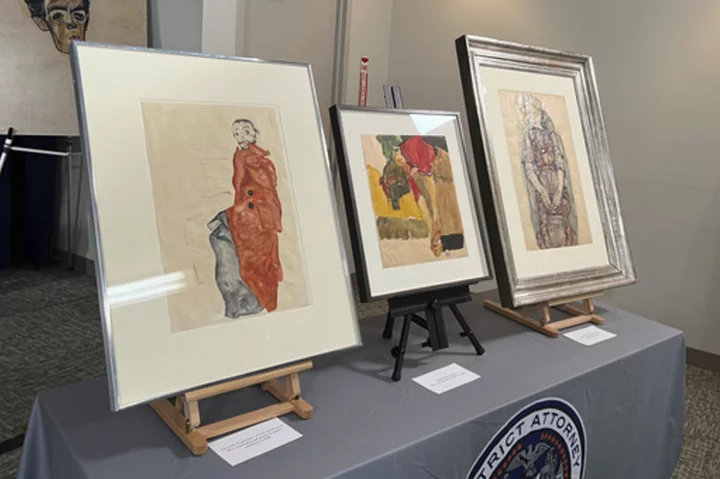MEXICO CITY (AP) — Supposed aliens landed in Mexico’s Congress but there were no saucer-shaped UFOs hovering over the historic building or bright green invaders like those seen in Hollywood films.
The specter of little green men visited Mexico City as lawmakers heard testimony Tuesday from individuals suggesting the possibility that extraterrestrials might exist. The researchers hailed from Mexico, the United States, Japan and Brazil.
The session, unprecedented in the Mexican Congress, took place two months after a similar one before the U.S. Congress in which a former U.S. Air Force intelligence officer claimed his country has probably been aware of “non-human” activity since the 1930s.
Mexican journalist José Jaime Maussan presented two boxes with supposed mummies found in Peru, which he and others consider “non-human beings that are not part of our terrestrial evolution."
The shriveled bodies with shrunken, warped heads left those in the chamber aghast and quickly kicked up a social media fervor.
“It’s the queen of all evidence," Maussan claimed. “That is, if the DNA is showing us that they are non-human beings and that there is nothing that looks like this in the world, we should take it as such.”
But he warned that he didn't want to refer to them as “extraterrestrials” just yet.
The apparently desiccated bodies date back to 2017 and were found deep underground in the sandy Peruvian coastal desert of Nazca. The area is known for gigantic enigmatic figures scraped into the earth and seen only from a birds-eye-view. Most attribute the Nazca Lines to ancient indigenous communities, but the formations have captured the imaginations of many.
In 2017, Maussan made similar claims in Peru, and a report by the country's prosecutor's office found that the bodies were actually “recently manufactured dolls, which have been covered with a mixture of paper and synthetic glue to simulate the presence of skin.”
The report added that the figures were almost certainly human-made and that “they are not the remains of ancestral aliens that they have tried to present”. The bodies were not publicly unveiled at the time, so it is unclear if they are the same as those presented to Mexico's congress.
On Wednesday, Julieta Fierro, researcher at the Institute of Astronomy at the National Autonomous University of Mexico, was among those to express skepticism, saying that many details about the figures “made no sense.”
Fierro added that the researchers' claims that her university endorsed their supposed discovery were false, and noted that scientists would need more advanced technology than the X-rays they claimed to use to determine if the allegedly calcified bodies were “non-human”.
“Maussan has done many things. He says he has talked to the Virgin of Guadalupe,” she said. “He told me extraterrestrials do not talk to me like they talk to him because I don’t believe in them.”
The scientist added that it seemed strange that they extracted what would surely be a “treasure of the nation” from Peru without inviting the Peruvian ambassador.
Congressman Sergio Gutiérrez Luna of the ruling Morena party, made it clear that Congress has not taken a position on the theses put forward during the more than three-hour session.
Believing or not was up to each member of the legislative body, but those who testified had to swear an oath to tell the truth.
Gutiérrez Luna stressed the importance of listening to “all voices, all opinions” and said it was positive that there was a transparent dialogue on the issue of extraterrestrials.
In the U.S. in July, retired Maj. David Grusch alleged that the U.S. is concealing a longstanding program that retrieves and reverse engineers unidentified flying objects. The Pentagon has denied his claims.
Grusch’s highly anticipated testimony before a House Oversight subcommittee was the U.S. Congress’ latest foray into the world of UAPs — or “unidentified aerial phenomena,” which is the official term the U.S. government uses instead of UFOs.
Democrats and Republicans in recent years have pushed for more research as a national security matter due to concerns that sightings observed by pilots may be tied to U.S. adversaries.









